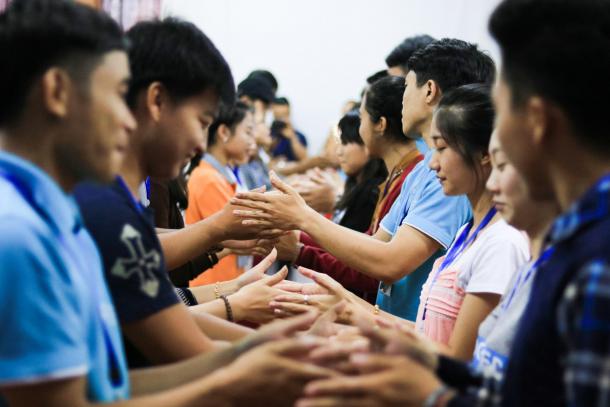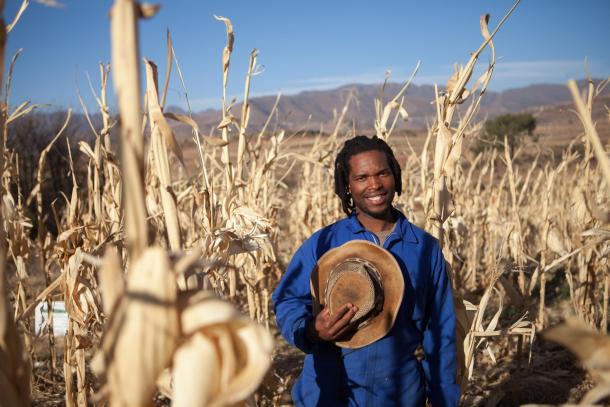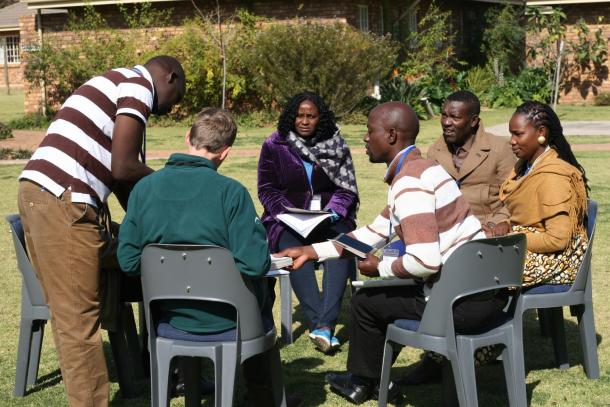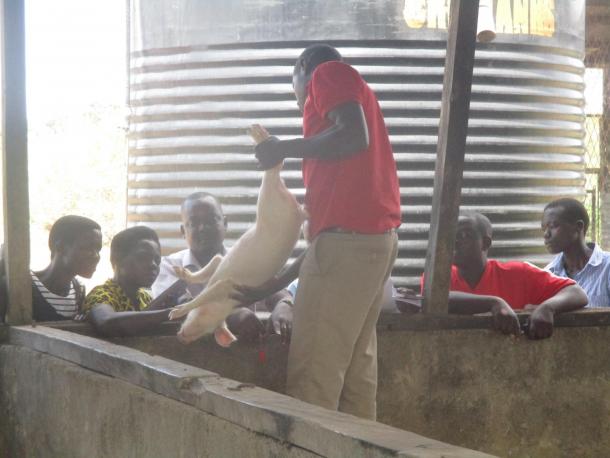Equipping leaders at home and around the world

People often say young people are the future.
MCC is working with partners in Canada, the U.S. and around the world to invest in opportunities for young people to serve. We are committed to nurturing and developing the leadership skills of a new generation, with a focus on Anabaptist values such as peacebuilding and servant leadership.
Here are just a few ways MCC is helping to equip young changemakers to make a difference in their home communities around the world:
Peace camps
Through peace camps and clubs, MCC supports partners as they work to develop peacebuilding skills.
Discrimination and division on the basis of religious identity is a driver of conflict in Lao People’s Democratic Republic (Laos). Religious identity can affect a person’s access to the labor market (particularly in government employment), treatment in schools and membership in civil society organizations.
In response to this, MCC established the Mittaphab (Friendship) Group to carry out the Youth Solidarity and the Peacebuilding project in 2006. The project engages young people to focus on leadership development and combat issues leading to ethnic and religious tensions.
Pictured above, participants in a peace camp in June 2018 practice their listening skills by responding to commands during an ice-breaking session.
MCC support helps trains young leaders and enables them to teach others through workshops, internships and peace camps.

Summer Service
Leadership development can happen right in one’s home church.
Abigail Endashaw stretched her comfort zone, built relationships and strengthened her faith when she took part in MCC’s Summer Service program in 2016.
Summer Service is a 10-week program for young adults from diverse ethnic backgrounds in the U.S. Participants work in their home communities, usually their own church, gaining valuable leadership skills while working to give back to their communities.
Endshaw’s motto that summer was, “Learn, plan, pray,” as she served at her church, Ethiopian Evangelical Church of Denver in Aurora, Colo.
“I learned a great deal about my fellow interns and our community. We spent a lot of time planning together about how to serve, encourage, love our interns and community well, and praying that as much as we gave, the Lord would give more and bless the people we served,” she said.
That summer Endshaw helped clean the church, prepared for and led church services, prayed for the community and brainstormed events that could serve the Ethiopian community in Aurora.

International Volunteer Exchange Program (IVEP)
MCC’s IVEP program helped contribute to 27-year-old Rorisang Moliko’s career trajectory.
Moliko, who hails from Lesotho, volunteered in Abbotsford, B.C. between 2012 and 2013 where he worked with Murray and Cheryl Siemens at Willow View Farms, a produce farm.
Moliko refers to his work on the farm as a mentorship. He learned to farm apples and winter vegetables, but also more about what it means to take initiative and lead others. Although at times he experienced culture shock and felt lonely, he says “it was my biggest achievement to be there.”
He and a number of other IVEP participants from Lesotho have returned to work at Growing Nations Trust, an MCC partner in Maphutseng, Lesotho. Growing Nations Trust (GNT) promotes conservation agriculture through a Christian lens called “Farming God’s Way.” GNT has demonstration fields which show the difference between conventional farming and conservation agriculture. It also does outreach in the community to promote better farming practices, including a resident students program.
Moliko now works as a farm manager at GNT, implementing a lot of the skills he learned in Abbotsford, while working at Willow View Farms.

Peacebuilding institutes
MCC also invests in peacebuilding training for adults around the world, including at the Africa Peacebuilding Institute (API).
Since 2001, MCC has invested in API in order to engage leaders across the continent in the powerful energy of peace and reconciliation in the name of Christ. MCC has been involved since the birth of API by sponsoring participants to attend, and funding the administration. MCC also provides oversight of the institute.
This four-week residential program includes participants from all over Africa. They participate in classes ranging from conflict transformation to trauma awareness to the theory and practice of peace clubs.
Participants from several African countries are pictured here at the 2018 API in Johannesburg, South Africa at the eMseni Christian Conference Centre.
MCC also supports other trainings, including the Mindanao Peacebuilding Institute (MPI), the Northeast Asia Regional Peacebuilding Institute (NARPI), the Great Lakes Peacebuilding Institute (GLPI) and regularly sponsors staff and partners to attend these and others.

Practical skills
Sometimes leadership development can look as simple as supporting young people in building livelihoods.
Youth from Soroti town, Uganda, learned about raising pigs at Arapai Agricultural College. The youth are participants in a project that MCC supports through partner Action for Peace and Development (APED) to increase food security and income for vulnerable youth.
Some participants have dropped out of school and some are heads of household. APED provides training in piggery, beekeeping and entrepreneurship, and helps project participants with start-up costs.
Through the project, youth also gain practical conflict resolution skills by learning to share responsibility and resolve project-based conflicts among themselves.

